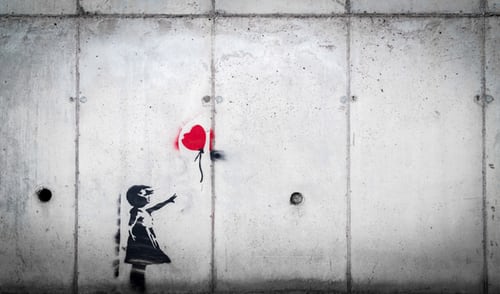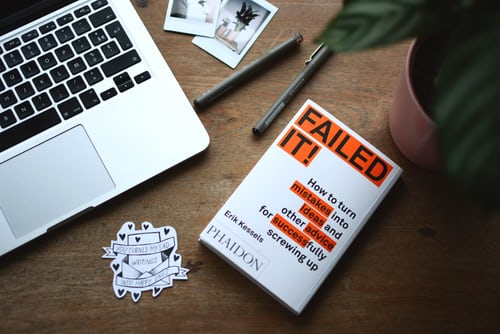Have you ever been told recovery is “worth it”?
I know when I was sick, I heard it a zillion times over and I can honestly say I believed it. I believed recovery was worth it even if I didn’t know how to get there because my idea of what recovery meant was pretty fanciful.
My idea of recovery was sunshine and rainbows and magic and a world in which everyone was kind and generous and I felt happy and wanted and useful and appreciated and like I belonged all the time. How could that not be worth it right?
The reality is recovery is worth it but recovered life is not perfect and if you have the belief that recovery will fix everything this is actually rather than impetus a huge barrier to you reaching recovery.
The side of anorexia nervosa that no one likes to talk about is that there are “good” things about being sick. Yep, that wasn’t a typo. THERE ARE GOOD THINGS ABOUT BEING SICK.
There’s a lot being sick protects you and exempts you from.
There are benefits to being sick which means there are trade-offs to reach a recovered life and those trade-offs are rough.
You won’t recover until you able to be wholly and completely honest with yourself and I believe a big part of that is recognising that yeah recovered is great but it’s also terrifying because recovery means growing up and it means taking responsibility for your life. It means going into the unknown without knowing that it will be any better and you don’t have to do it, it’s a choice.
I literally remember being frustrated and even mad at people in my life (on the inside of my mind never in real life of course) who didn’t have anorexia because to me they had it so easy.
To me they had it amazing and from my judgement they weren’t fully utilising or appreciating that (aka they didn’t know how good they had it!) If I were in their position I’d be doing so much, I’d not be taking for granted the health and happiness and choice I perceived they surely must have.
“If only I wasn’t sick my life would be x, y, z” was one of my top thoughts.
Which is why I am going to pop all the sunshine and rainbow bubbles you have that “if only” you weren’t sick your life would be x, y, z because yes if only you weren’t sick your life could be x, y, z but it also could just as easily not be.
The reality is your life is only ever going to be x, y and z if you also choose those things.
If you go after those things, if you put effort into those things and if you actively create, support and invest in those things.
Anorexia is not the only thing preventing you from living a magical life and the absence of anorexia does not mean you will live any more magical a life because to create the life you want you have to also DO IT!
Simply being free of the pain alone does not automatically mean you will do it. Only doing it means you will do it.
Happiness comes from doing the things which make you happy and there is no short cut to that.
What I’m getting at is that there’s pros and cons of staying sick (I know shock, horror how dare I suggest anorexia is useful right!? But it is)
So, without further ado here’s 11 cons of recovery no one tells you about or 11 reasons why recovery sucks (aka 11 reasons to not recover, if you will).
- You Will Lose “Friends” and “Support”

I guarantee that if you’re sick with anorexia nervosa you will have friends and people who “support” you who aren’t truly your friends and who aren’t truly in support of you.
They’re there because you do what they want.
There’re there because you’re easy, you fit in with their plans and they know they can rely on you, ask you favours they couldn’t with others or call on you with zero notice because you never say no.
Essentially, they’re using you.
They may not mean to, they may not even know they are and they may very well be very lovely people but when you are sick you’re a people pleaser, a placator, a peace keeper, a protector and a yes say-er and if you were to recover and no longer do this because when you recover you are your own unique person and you value your time more (believe me!) there’ll be people in your life who are used to you being a pushover and who won’t tolerate you being you.
This may also extend to your romantic relationship. It did for me because my relationship was based on me enduring what no human being should because I didn’t value myself and because I thought I was helping a deeply troubled person feel loved and learn to trust (I wasn’t I was facilitating abuse).
Losing them hurts like f*ck (even when you know it’s necessary).
In my recovered life now I’ve realised people were more likely to support me when I was down, when I was sad, confused and overwhelmed and not getting anywhere. I guess because people bond over shared misery and also because you’re not a perceived “threat” to them when you’re so sick and useless but when you’re getting well or are well you’re threatening because there are many people who believe we can’t all be well and thriving at the top together and that you’re wellness, success and awesomeness somehow detracts from theirs.
So, in summary to kicking of a list of 11 reasons to not recovery is less friends, breakups and less support. I’d say that’s a pretty good reason why recovery sucks.
2. You Will Have to Say No

When you were sick there was a lot of reasons you “had” to say no and a lot of reasons you “had” to miss out (social anxiety, OCD, depression, fear of what food might be there, fear of people looking at you and so on) when you’re recovered you’ll also still have to say no to some things! Albeit for different reasons but still a no is a no and saying no is hard.
You will have to “miss out” on things in favour of your bigger goals and plans and you will have to say no to things you don’t want to do.
Once you’re in touch with your emotions, wants and needs enough to differentiate between things you do want to do and things you don’t want to do, you’ll have to then actually say no to those in the “things I don’t want to do” box.
When I was sick, I left my schedule pretty open (ok completely open) for other people because I knew other people would want me and if I made plans or organised something I wanted to do the guilt would be overwhelming if I’d then have to tell them I couldn’t see them because I already had other plans.
I’d only ever get around to the things I wanted to do and even the things I needed to do as a very last priority which most of the time meant never.
When you’re no longer dropping your life and answering to the every whim of others and saying no it can be uncomfortable but one of the best things I ever read was “if you don’t know how to say no all your yeses don’t mean anything”. It is true.
If you only says yes then your saying yes isn’t meaningful. If you only say yes your saying yes isn’t decisive, it isn’t beautiful or a compliment to the person you’re saying yes to.
It’s a yes to avoid conflict or just make you feel better and that’s a crap yes.
You want your yeses to be all in and you want your nos to be all out because saying no isn’t saying no out of fear or perfectionism it is saying no because no is in line with your values, goals and feelings at that time. Similarly saying yes isn’t saying yes to everything it is saying yes when saying yes feels good.
3. You Will Have to Feel Your Feelings

You will have to feel your feelings.
You have to learn to feel your feelings, identify what they are and why you’re having them, appreciate them and then do your best to fix the situation that brought up those feelings for you and others if it’s negative.
This is hard because you will now have to feel your feelings and do something about it other than the numbing behaviours of overexercising or starving (or whatever is your go to).
4. You Will Have Nothing to Blame

On the other side of recovery there’ll be things you can’t do, there’ll be things you suck at, you’ll make major and minor mistakes maybe you’ll fail an exam, maybe you’ll be rejected by the guy you like, maybe you won’t get invited to the party when everyone else does, maybe you’ll get fired from work or maybe your business will fail and when any of this happens you won’t have the illness to blame.
This is a tough one because naturally we like to have a reason why we “fail” and mental illness (anxiety, depression, anorexia, bulimia, OCD) are all great scapegoats. Let me tell you now, it’s ok you don’t need a mental illness to fail spectacularly you can do that all by yourself and for no reason at all (and you will).
5. You Will Have to Look At Your Incompetence’s

I got sick as a young teenager, I got sick when I was only just beginning to learn how terrifying and confusing life as an adult was let alone test it out.
I recovered almost 15 years later and found myself so far catapulted into life as an “adult” it wasn’t even funny.
There was so much I didn’t know how to do, and I was ashamed of not being able to do all the things I thought I “should” be able to do.
I felt I was so far behind everybody and it wasn’t all in my head I actually was! A lot of my friends had full time steady, reliable jobs, husbands, homes and babies.
The reality is when you don’t know how to do things you have to learn because there’s literally nothing you should be able to do but there’s a lot you can learn to do (there’s still so much I still don’t know how to do and rather than judge myself for this I just say ok and go about learning because it’s actually fun to learn!)
6. You Won’t Have An “Excuse” to Eat, You’ll Just Have to Eat

Each and every time I was “putting on weight” I had a reason to eat. I was going to die if I didn’t.
That’s a pretty compelling justification that eating is ok but where do you go, what do you do when it’s no longer that critical?…
I never got that far ahead when I was sick. I’d eat and gain the weight and be “done” which of course meant I immediately lost the weight and the whole cycle would start over again because that’s not how it works. Recovery means a commitment to recovered and living healthy as more than a temporary goal on the scale.
When you’re healthy believe it or not you still have to keep eating to stay healthy or further improve your health and literally just to continue to live life.
When you’re free from anorexia you just have to eat.
7. You Have to Figure Out How to Do Things That Are Good for Your Health

This is actually funnily enough a tough one and a new one for me.
There’s so much information out there as to what’s “good” or “bad” for us and a lot of it completely conflicting saying the very same thing is “good” or “bad”! To put it lightly it’s confusing af.
When I was sick, I was sick and I didn’t care enough about myself to care about my health but when I recovered I wanted to know how to actually take care of myself so I started learning and woah (I think you know what I mean).
My best recommendation here would be to see people who are formally educated in health (Dietitians, Physiotherapists, Dentists) and get your information from them (not from Instagram which we all know would be silly but it’s so compelling and colourful and believable…).
Get great information from great sources and let the rest go.
The rest is just a distraction, the rest is temporary and not fuelling your health but detracting from it.
8. You Will Have to Buy New Clothes

Now, I don’t know how much this one will matter to you depending on your enjoyment of shopping but for me this kind of sucked.
I hate shopping, I had worn pretty much the same clothes or the same sizes between the ages of 12-28 and all of a sudden I had to buy new things and I had to look at clothing sizes and I had to go to the change rooms and try things on because just looking for the smallest size and buying it no longer worked (I did it and had to take things back).
9. People Will Comment On Your Weight Gain

People will comment on your weight gain.
Whether it’s nice comments, neutral comments or negative comments they’ll do it.
When you’re recovered this isn’t a psychological stress as it is when you’re sick though. I remember when I was sick even people simply sharing an offhand observation that I’d gained weight (“you look good” or “you look healthy” or even “you look fit”) would be immensely distressing and the cause of more than one full blown relapse because if I looked fine but in my head I was still struggling what was the “point” of looking good?…
There’s no help and no understanding when you don’t look sick but when you think about it there really isn’t that much of it when you look sick though either because no one can truly help you make the changes you need to make in the way you need to other than you!
10. You May Still Have “Carry Over” Problems

The reality is not everything goes away when anorexia goes away.
You may still have carry over problems as nice little reminders of all the time you spent in hell.
My teeth have parts where the enamel is missing from years of malnutrition and ketoacidosis, my hair is still in recovery and about 1/100th of the thickness and shine it used to be and I still have digestive problems sometimes.
What I’ve realised since being recovered is that while some of my problems were related to the illness some of them weren’t (or were just exacerbated by the illness) but still there when the illness was gone. Your body is not going to be “perfect” when you recover.
11. You Will Have to Build A Whole New Identity

This is a plus of recovery (as are all of these points) but it is also hugely stressful.
Who you are (whether you like it or not) has become connected to and intertwined with the illness and how both you and others perceive you which means it is scary to let that go.
This is normal because as much as being sick sucks it’s familiar and as the owner of a human brain your brain is always going to choose what’s familiar over something new. That is until it has proof that the something new is better. Which itself is a catch 22 because the proof doesn’t come until you’re doing it. Doing it is the only way you’ll gain proof.
So, try new things out.
Test drive the new you and give your brain a chance to realise that this works as good as (actually way better than) the old way you were doing it. The only reason you’re still the way you are is because you keep doing the same things, do something different and you’ll be different.
When I was sick anorexia took up about 97.9% of my brain space the rest of the space was filled to overflowing with guilt that I wasn’t “normal” and that I couldn’t just eat or do normal things. When you’re recovered that’s a whole load of brain space you’ve got there… what cha gonna do with it?
Recovered means being free from the pain but it also means more than that it means growing.
.
After All That Would I Still Recommend Recovery?

Yep, absolutely, 100% hands down I would.
I would because even with these 11 things that suck (and more, oh believe me there’s more) when you’re no longer sick you have choice and when you have choice you have a life.
However, there’s no rule that says your recovered life must be better than your sick life.
The harsh truth is that your recovered life will be what you make it.
At least consider giving yourself the chance to find out just how fabulously you can muck it up because that’s unknown and that’s filled with potential and what you can be certain of is that your sick life will only ever be what anorexia makes it – more of the same.
Instead of telling yourself recovered life would be amazing, prove it!
With All My Heart I Hope You Found This Information Useful & Inspiring

Become Great. Live Great.
Bonnie.



